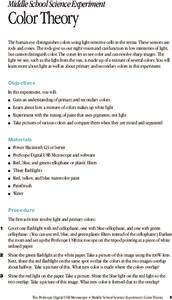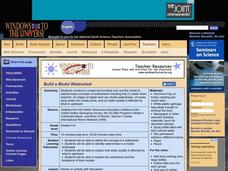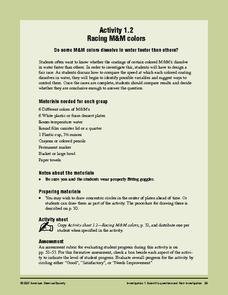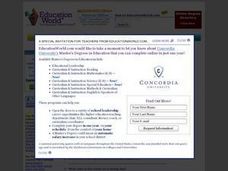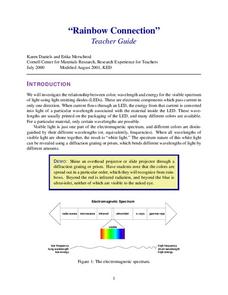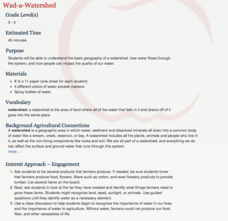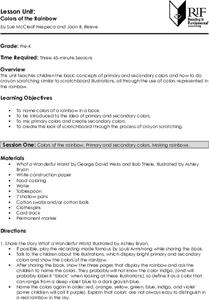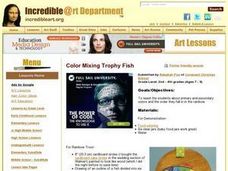Curated OER
Stacking Water
Students experiment with different salinities of water using straws and different colors of water. They collect and interpret data from the experiment.
Curated OER
Be "Sun-sible" about Heating Water
Learners create a solar water heater. In this solar energy lesson, students conduct an experiment to determine which colors absorb more radiant heat. Learners investigate the relationship of heat loss to insulation. Students then create...
Curated OER
How Are Colors Created?
Kids explore primary and secondary colors, as well as the concepts of tints and shade in a series of color lessons. The packet includes detailed directions for how to use BrainPOP Jr. resources to create learning...
Curated OER
Color the Snow
Are your teaching in a cold and snowy environment? If so, then try out this fun activity with your class. You mix a variety of colors in large jars to show learners the difference between primary and secondary colors, then let them mix...
Curated OER
Putting It All Together
Students examine a painting. For this shapes and puzzle lesson, students view Guston's painting Blue Water and identify the colors, shapes and recognizable forms. Students work in groups to put together puzzle pieces of the...
Curated OER
Emotion Painting
Budding artists explore the nature of emotion through artistic expression. They discuss feelings, colors, line, and design, mix colors and then create an emotive piece that expresses a singular emotion. There are three cross-curricular...
Curated OER
Color Theory
Students are able to gain an understanding of primary and secondary colors. They are able to explore about how a mixture of colors makes up white light. Students are able to experiment with the mixing of paint that uses pigments, not...
Curated OER
Build a Model Watershed
Collaborative earth science groups create a working model of a watershed. Once it has been developed, you come along and introduce a change in land use, impacting the quality of water throughout their watershed. Model making is an...
American Chemical Society
Racing M&M Colors
More than anything, this is great practice in scientific inquiry. After discovering that the color coating of an M&M® dissolves in water during a preceding activity, investigators now question whether or not the color makes a...
Chymist
The Extraction and Identification of Artificial Food Colors
Did you know some food dyes are considered safe while others are considered carcinogenic? During the experiment, young chemists extract artificial food colors from prepared foods. Then, they use chromatography paper to identify...
Curated OER
Primary and Secondary Colors
Young scholars explore primary and secondary colors. In this art instructional activity, students use jars of colored water to create the secondary colors.
Curated OER
Hot and Cold Colors
Students engage in an activity that will allow them to observe that hotter conditions can speed up changes in materials. They will predict whether food coloring disperses more quickly in hot, cold, or room temperature water, and then...
Curated OER
Global Change: Where Land, Air and Water Meet
Learners discuss the atmosphere as a mixture of gases. In this science lesson, students explore the world's oceans and fresh waters understanding that there are dissolved chemicals. Learners realize that many substances dispersed in air...
Curated OER
Mixing Primary Colors
Students demonstrate ways to mix primary colors. In this visual arts lesson, students use gelatin and food coloring to create various color mixtures. Students also use tempra paint to mix colors together.
Curated OER
Spicy Hot Colors
Second graders investigate the book Spicy Hot Colors. In this colors instructional activity, 2nd graders experiment mixing paint and creating different colors. Students make text to world connections and record their responses and draw...
Curated OER
Colors of the Universe Scavenger Hunt
In this colors of the universe worksheet, students explore the Internet to access one specific website to answer five short answer questions about the colors of the universe.
Cornell University
LEDs Rainbow Connection
View LED lights through the eyes of a scientist. Young scholars learn to view light as a wave frequency and connect various frequencies to different colors on the light spectrum. A lab activity asks groups to measure the frequency of...
Agriculture in the Classroom
Wad-a-Watershed
What kind of impact do humans have on watersheds? Find out in a lesson that defines, explores, and promotes ways to protect our watersheds. The ultimate goal of the lesson is for learners to discover how a watershed is impacted by...
Royal Society of Chemistry
A Reversible Reaction of Hydrated Copper (II) Sulfate
How can removing water change the color of a substance? Lab partners remove the water of crystallization from hydrated copper (II) sulfate, record their observations, then rehydrate the solid. The resource is printable and contains ideas...
Curated OER
Water Pollution and Food Chains
Sixth graders study the effect of pollution in our food chains. For this plant biology lesson, 6th graders first experiment with pollution by placing a carnation in colored water. Next they use a food chain triangle to see the...
Curated OER
Colors of the Rainbow
Students explore primary and secondary colors through the use of colors represented in the rainbow. They read and discuss the book, 'What a Wonderful World,' mix paint colors and paint rainbows, and create scratchboard paintings.
Curated OER
Color Mixing Trophy Fish
Students compare colors. In this color lesson, students determine which colors are primary and which are secondary. Students investigate rainbows and create a piece of art organizing colors as they appear in a rainbow.
Curated OER
Color Mixing
Students have cups of different colored water. They add a new color by using a medicine dropper and see how new colors are formed.
Curated OER
Water, Water Everywhere
Students study the location of Earth's water and study the water cycle using a terrarium. In this water study instructional activity, students study a model globe for the Earth and find Alaska. Students locate the bodies of water and...








